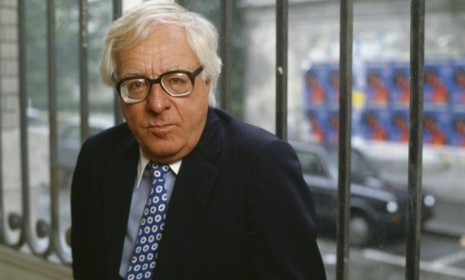Remembering Ray Bradbury: His most affecting quotes
Science fiction's mainstream apostle died Wednesday at age 91. Here, writers gather their favorite bits of wisdom from the prolific Fahrenheit 451 author

A free daily email with the biggest news stories of the day – and the best features from TheWeek.com
You are now subscribed
Your newsletter sign-up was successful
Ray Bradbury, whom The New York Times calls "the writer most responsible for bringing modern science fiction into the literary mainstream," died Wednesday at age 91. The author of sci-fi classics The Martian Chronicles and Something Wicked This Way Comes may be best known for the 1953 masterwork Fahrenheit 451, his discomfiting portrait of a future where society has outlawed literature. He was also a font of poignant wisdom and constructive advice. Numerous publications are remembering Bradbury through his quotes, with fans following suit using the Twitter hashtag #BradburyChronicles. Here, a selection of the most resonant Bradburyisms:
On his legacy
"Do you know why teachers use me? Because I speak in tongues. I write metaphors. Every one of my stories is a metaphor you can remember."
The Week
Escape your echo chamber. Get the facts behind the news, plus analysis from multiple perspectives.

Sign up for The Week's Free Newsletters
From our morning news briefing to a weekly Good News Newsletter, get the best of The Week delivered directly to your inbox.
From our morning news briefing to a weekly Good News Newsletter, get the best of The Week delivered directly to your inbox.
"I have never listened to anyone who criticized my taste in space travel, sideshows, or gorillas. When this occurs, I pack up my dinosaurs and leave the room."
"I sometimes get up at night when I can't sleep and walk down into my library and open one of my books and read a paragraph and say, 'My God, did I write that?'"
A free daily email with the biggest news stories of the day – and the best features from TheWeek.com
On the future
"I was not predicting the future, I was trying to prevent it."
"We must move into the universe. Mankind must save itself. We must escape the danger of war and politics. We must become astronauts and go out into the universe and discover the God in ourselves."
(via CNN)
"I don't think the robots are taking over. I think the men who play with toys have taken over. And if we don't take the toys out of their hands, we're fools."
"There is no future for e-books, because they are not books. E-books smell like burned fuel."
On writing
"I don't need an alarm clock. My ideas wake me."
"You must stay drunk on writing so reality cannot destroy you."
"Write a short story every week. It's not possible to write 52 bad short stories in a row."
"And what, you ask, does writing teach us? First and foremost, it reminds us that we are alive and that it is gift and a privilege, not a right.... So while our art cannot, as we wish it could, save us from wars, privation, envy, greed, old age, or death, it can revitalize us amidst it all."
On burning books
"There are worse crimes than burning books. One of them is not reading them."
(via Twitter)
"You don't have to burn books to destroy a culture."
On life
"You’ve got to jump off cliffs all the time and build your wings on the way down."
"Stuff your eyes with wonder, live as if you'd drop dead in ten seconds. See the world. It's more fantastic than any dream made or paid for in factories."
"Why would you clone people when you can go to bed with them and make a baby? C'mon it's stupid."
"I have three rules to live by. One, get your work done. If that doesn't work, shut up and drink your gin. And when all else fails, run like hell!"
"Every morning I jump out of bed and step on a landmine. The landmine is me. After the explosion, I spent the rest of the day putting the pieces together."